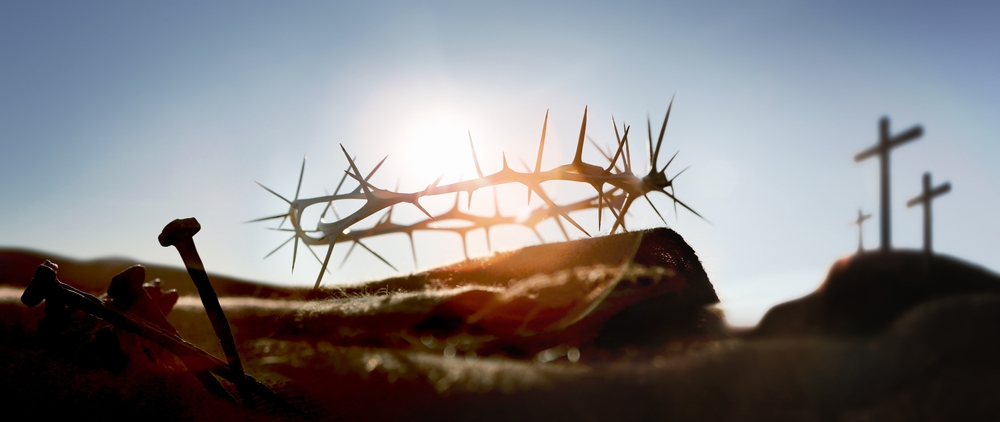In his new book, Where Is God in a World with So Much Evil?, Collin Hansen, vice president for content and editor-in-chief for The Gospel Coalition and executive director of the Keller Center for Cultural Apologetics, takes on one of the most challenging apologetic issues: the problem of evil. Hansen does not waste time dancing around the problem: He begins with the Holocaust and cites a haunting scene from Elie Wiesel’s novel Night. On one of his first nights in the concentration camps, Wiesel describes how several Jews were hanged, and while watching them die, he hears someone near him cry, “Where is merciful God, where is He?” Wiesel reflects on the scene: “Never shall I forget that night, the first night in camp, which has turned my life into one long night.…Never shall I forget those moments which murdered my God and my soul and turned my dreams to dust.”
In the modern world, Hansen knows that the Holocaust transformed our standards for evil. “Before the war,” Hansen writes, “Jesus Christ was the most potent moral figure in Western culture.” Then, citing the work of historian Alec Ryrie, he concedes: “The overwhelming tragedy of the war displaced Jesus as the fixed reference point for good and evil.” With extreme evil made plain before the world, silence in the face of injustice became unacceptable, with God’s own apparent silence raising lingering issues about His goodness.
While most people have not experienced this type of radical evil, all of us have experienced movements of suffering and loss and felt our minds or souls welling up with questions for God. For many it appears that God—if there is a God—is silent. Implicit in this notion is the assumption that God owes humanity an explanation, that God is on trial before the court of human opinion. Here Hansen resorts to the image of the Grand Inquisitor from Dostoevsky’s The Brothers Karamazov, when Jesus is—literally—put on trial for the pervasive and persistent nature of evil. Ater entertaining questions of divine sovereignty and human responsibility, Jesus does not respond; instead, he gently kisses the inquisitor’s forehead.
Why won’t God speak up and defend himself? “Maybe,” Hansen writes, “it’s because even if he did, we wouldn’t listen.” God does not bend to our whims or queries, and even if God explained his reasons, would we be able to grasp them? It does not matter whether God finally speaks: God is still God and we are still His creations. And as creatures, when we judge God, “we don’t replace him with a superiority morality”; instead, as we have found repeatedly throughout history, “anything goes.” If in our frustration we replace God with our own vision of right and wrong, we do not build utopia but a nightmare.
Hansen, however, presses the argument even further. When we investigate the depths of the problem of evil, we discover that evil is not merely external; it is not just “out there” somewhere in the world. Evil is in us. Modern discussions of morality, especially in the 20th century, have tended to shift the question of evil “from something inside us to something out there among our enemies.” Evil is them, “the other,” that person who wronged me in some way. This kind of thinking is a natural extension of the kind of “expressive individualism” that continues to plague our society. Evil is not in me; it is in everyone else.
So the problem is not necessarily “the silence of God,” Hansen writes. “Maybe we are not listening or maybe we just prefer the sound of our own voices.” Hansen cites that famous quote from Aleksandr Solzhenitsyn that still rings true: “The line separating good and evil passes not through states, not between classes, nor between political parties either—but right through every human heart.” Hansen slowly turns our pointing fingers back toward ourselves, where we come face-to-face with own sin and realize that “we need an objective standard of morality bigger than ‘not Hitler.’”
In the West, we live in a world that still possesses a “residue of Christendom,” and critics of God often want things both ways. We want to be able to judge God, but with the standards inherited from that fading sacral state—and with the very minds that God Himself created. “That’s why it feels right to demand a response from God,” Hansen writes, “because we know he’s a God who speaks.”
But to understand how God speaks, Hansen leans on the example of Job’s suffering. Job and his friends debate his plight and question everything about his sincerity and guilt. They all throw questions at God and wonder at his silence. Then God speaks from the whirlwind. God is not threatened by questions but instead invites conversation. “I think God is speaking—loudly,” Hansen writes. “Our very sense of justice tells us that God hears every child’s cry.” But through their questions, Job and his friends imagine that God’s silence is His problem. God is the one who must answer us. God is on the hook to explicitly address our questions. And this brings us back to the humble point that we do not simply need sin removed from out there—even, perhaps, within God Himself—but inside us, in our hearts. “We’re not as bad a Hitler. But that doesn’t make us good,” Hansen argues.
God has spoken about the sin problem through Christ. Christ is the mediator, the suffering servant who takes away the sin that plagues us. “He was oppressed, and he was afflicted, yet he opened not his mouth,” the prophet tells us (Isa. 53:7). Christ was led to the slaughter, but the silence of God did not negate the “sounds of salvation that emulated from the hill outside Jerusalem,” where the people heard the “cries of the Son of God.” Jesus, even in his agony, knew that by his death many would be healed. The sounds of salvation echoed from the cross, and through such an evil—the murder of God—salvation has come.
At the cross, Hansen reminds, “he made him to be sin who knew no sin” so that “in him we might become the righteousness of God” (2 Cor. 5:21). With our eyes fixed on the cross and the resurrection of Christ, we know that wars still rage and the “sounds of slaughter still haunt every corner of the church,” but Christians face such suffering with the knowledge that a final judgment is coming and no evil will go unpunished. “On that day,” Hansen writes, “every child’s cry will find consolation.” God hears the cries of his children and knows the reasons for their tears. He will, one day, wipe them away, and death will be no more. In short, the cross is the one and only answer to our questions about evil.
Finally, Hansen concludes with some practical advice for helping those struggling with God’s silence. First, he encourages his readers to “raise your voice to God on their behalf” and weep with those who weep. Lament, like the prophets of the Old Testament, over “the evil of our fallen world” and get down into the dust and comfort those who mourn. Christians are called to be a comforting people to those who are hurting. Second, while you are ministering to them, be quick to listen and slow to speak. Job’s friends demanded a formula to explain his immense suffering when they just should have stayed quiet, because God does not owe us an explanation.
What is most helpful about this advice, and the book itself, is that it is perfect for someone who is suffering right now. The book is more of a booklet, small and to the point, but filled with wisdom blended with persuasive illustrations and practical advice. This work is perfect for what I might call the “pastoral response” to the problem of evil. Those who are suffering are not often interested in reading a dense, technical work with a range of views on the topic. Those books are more helpful for pastors and students preparing to preach or teach on the subject for a general congregation, and there are plenty of examples that fit that bill.
This short work is something different. It blends Scripture and wisdom and gently turns the problem of evil around to see that it is not merely “out there” but in us, too, in our own hearts. Hansen does not come at the one who questions God with a blowhorn, but with a still, small voice that guides the reader to behold the God who speaks and the God who saves. Even in the face of horrors like the Holocaust, we realize that God is there in a world with so much evil so he may overcome it—once and for all. May that day come soon.

